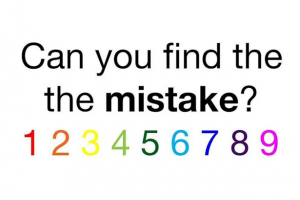This article gives you eight tips for proofreading your medical school personal statement before you submit it.
Leave some time between finishing and proofreading your medical school personal statement.
People become accustomed to text that they are familiar with and their brains gloss over errors. Leave some time before proofreading your Medicine personal statement so you can view it with a fresh pair of eyes and are not tired of it, which increases the likelihood of missing errors. The reason for this is your brain is constantly filling in gaps and making things seem as your brain perceives that they should be. This is not necessarily how they are in reality. This is why we fall for optical illusions. The following image is an example of how this quality of the human mind affects your ability to proofread your Medicine personal statement.
Proofread your Medicine personal statement in the right frame of mind
Make sure that you are not distracted, tired or rushed when proofreading your medical school personal statement. Proofreading a Medicine personal statement needs concentration and patience.
Be aware of homonyms
Homonyms are words which share the same spelling or pronunciation but have different meanings. For example, complement and compliment as well as they’re, their and there and your and you’re.
Be aware of the limits of spelling and grammar checkers
Spelling and grammar checkers are a useful tool, but especially with grammar, they miss a lot of errors and are prone to misinterpretations. Spelling and grammar checkers are weak at spotting homonyms and cannot give you reliable advice on the overall tone and consistency of your Medicine personal statement. Skilled humans are much better at this.
Print out a copy
People perceive printed text and text on a screen differently. Many people find it easier to spot errors in the former over the latter. Also, the changeup will help your brain not to fill in gaps and gloss over things (as we discussed above) because the printed text will be a change, so your brain will be in a more attentive state.
Reading out aloud
This can give you another perspective as it will use different areas of your brain and as with printing, it will introduce a changeup which makes your brain concentrate more. Do this to help you proofread your Medicine personal statement.
Does it meet the UCAS criteria?
Does your Medicine personal statement fall within the 4000 characters (including spaces) limit? This equates to about 500-550 words. UCAS also limit the number of characters per line and limit the line count to 47, so it is not quite as simple as 4000 characters, it is whichever limit is reached first. UCAS suggest word processing your Medicine personal statement first and copying it into UCAS later to check the character limit. You can save drafts before submitting your final statement.
If your Medicine personal statement is too long by a small number of characters, then there are clever ways to shave off a few characters. However, make sure that you do not reduce characters by using incorrect spelling and grammar. If your Medicine personal statement is over the character limit by more than a smaller amount, then it is still possible to shave off characters but still convey the same message by writing in a more concise style. This can even make your personal statement more powerful. If this still is not sufficient, then you will have to think about making more fundamental changes to your Medicine personal statement. Our blog article an example of a successful medicine personal statement may be useful for you.
Consider our 360° application review services
Countless people gain a place at medical school without using proofreading services. Rest assured, an editing service is not essential to write an excellent Medicine personal statement and gain a place at medical school so do not believe any companies who tell you otherwise. We believe, however, that our Medicine Application Services offer an incredible amount of value to your application.
We are different to many competitors as we go beyond merely checking for spelling and grammar. A professional proof-reader, as well as a doctor (who successfully received all four UCAS offers to study Medicine), will both review your Medicine statement. This is far superior to many other services who use untrained students or people with no Medicine admissions experience and without professional proofreading skills. After making enhancements to your statement, we comment on the strength of your application. We consider your UKCAT, academic grades, work experience and extracurricular activities and suggest ways to enhance your application further in what time you have left. We suggest things which may come up at interview specifically as a result of your personal statement.
